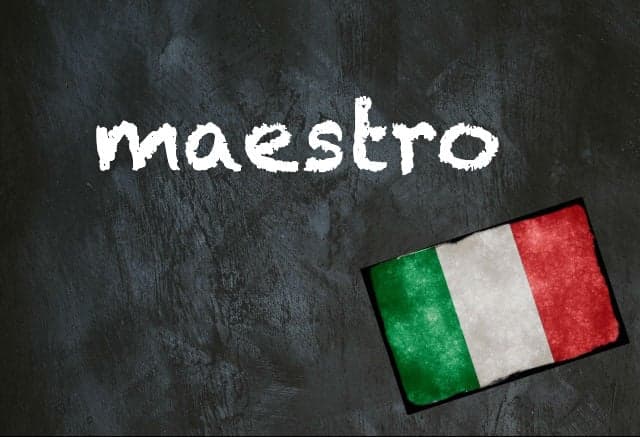
Italian word of the day: 'Maestro'

Are you sure you've mastered the Italian original of this word?
As Italy mourns the loss of one of its musical greats, composer Ennio Morricone, it seems appropriate to look at the word English- and Italian-speakers alike would choose to describe him: maestro.
Remembering Morricone: Ten of the Italian composer's greatest film scores
Along with finale, opera, diva, virtuoso and others, it's one of the long list of words that English has borrowed from Italian to talk about music.
But while we use it almost exclusively for conductors or lead performers, in Italian maestro has applications well beyond music.
Hear un maestro pronounced in Italian:
The word comes from the Latin term magis ('more', 'great') and its derivative magister, the title given to a qualified teacher or professor – which is why teachers are addressed as maestro (masculine) or maestra (feminine) in Italian.
Scusi, signora maestra/signor maestro...
Excuse me, miss/sir...
The term is used chiefly for primary school teachers (maestri di scuola or maestri elementari), but you can also use it to refer to any type of instructor – such as una maestra di sci ('ski instructor') or un maestro di ballo ('dance instructor').
The same Latin root gave us the word 'master' in English (just think about how we call an advanced university qualification a 'masters degree').
And just like in English, by extension maestro also means 'expert': so skilled you're good enough to teach others.
In quella via operavano i maestri scultori.
The master sculptors worked in that street.
È un maestro nella cucina.
He's a pro in the kitchen.
Non si diventa maestro in un giorno.
You don't become an expert in a day.
Similarly you can call an expert manoeuvre a 'masterstroke': un colpo da maestro.
Calling someone maestro/a to their face is above all a sign of respect: so while you might well address a conductor as maestro, their actual job description is direttore d'orchestra.
Meanwhile you'd find a whole lot of other maestri backstage in an Italian opera house, including the maestro collaboratore (accompanist), maestro di palcoscenico (stage manager) and maestro suggeritore (prompter).
So while the Italian original differs a little from our borrowed English version of it, there's one thing both languages can agree on about maestro: Morricone was one.
Ricorderemo sempre, con infinita riconoscenza, il genio artistico del Maestro #EnnioMorricone. Ci ha fatto sognare, emozionare, riflettere, scrivendo note memorabili che rimarranno indelebili nella storia della musica e del cinema pic.twitter.com/SNGmJjfJ2H
— Giuseppe Conte (@GiuseppeConteIT) July 6, 2020
Do you have a favourite Italian word you'd like us to feature? If so, please email us with your suggestion.
Comments
See Also
As Italy mourns the loss of one of its musical greats, composer Ennio Morricone, it seems appropriate to look at the word English- and Italian-speakers alike would choose to describe him: maestro.
Remembering Morricone: Ten of the Italian composer's greatest film scores
Along with finale, opera, diva, virtuoso and others, it's one of the long list of words that English has borrowed from Italian to talk about music.
But while we use it almost exclusively for conductors or lead performers, in Italian maestro has applications well beyond music.
Hear un maestro pronounced in Italian:
The word comes from the Latin term magis ('more', 'great') and its derivative magister, the title given to a qualified teacher or professor – which is why teachers are addressed as maestro (masculine) or maestra (feminine) in Italian.
Scusi, signora maestra/signor maestro...
Excuse me, miss/sir...
The term is used chiefly for primary school teachers (maestri di scuola or maestri elementari), but you can also use it to refer to any type of instructor – such as una maestra di sci ('ski instructor') or un maestro di ballo ('dance instructor').
The same Latin root gave us the word 'master' in English (just think about how we call an advanced university qualification a 'masters degree').
And just like in English, by extension maestro also means 'expert': so skilled you're good enough to teach others.
In quella via operavano i maestri scultori.
The master sculptors worked in that street.
È un maestro nella cucina.
He's a pro in the kitchen.
Non si diventa maestro in un giorno.
You don't become an expert in a day.
Similarly you can call an expert manoeuvre a 'masterstroke': un colpo da maestro.
Calling someone maestro/a to their face is above all a sign of respect: so while you might well address a conductor as maestro, their actual job description is direttore d'orchestra.
Meanwhile you'd find a whole lot of other maestri backstage in an Italian opera house, including the maestro collaboratore (accompanist), maestro di palcoscenico (stage manager) and maestro suggeritore (prompter).
So while the Italian original differs a little from our borrowed English version of it, there's one thing both languages can agree on about maestro: Morricone was one.
Ricorderemo sempre, con infinita riconoscenza, il genio artistico del Maestro #EnnioMorricone. Ci ha fatto sognare, emozionare, riflettere, scrivendo note memorabili che rimarranno indelebili nella storia della musica e del cinema pic.twitter.com/SNGmJjfJ2H
— Giuseppe Conte (@GiuseppeConteIT) July 6, 2020
Do you have a favourite Italian word you'd like us to feature? If so, please email us with your suggestion.
Join the conversation in our comments section below. Share your own views and experience and if you have a question or suggestion for our journalists then email us at [email protected].
Please keep comments civil, constructive and on topic – and make sure to read our terms of use before getting involved.
Please log in here to leave a comment.